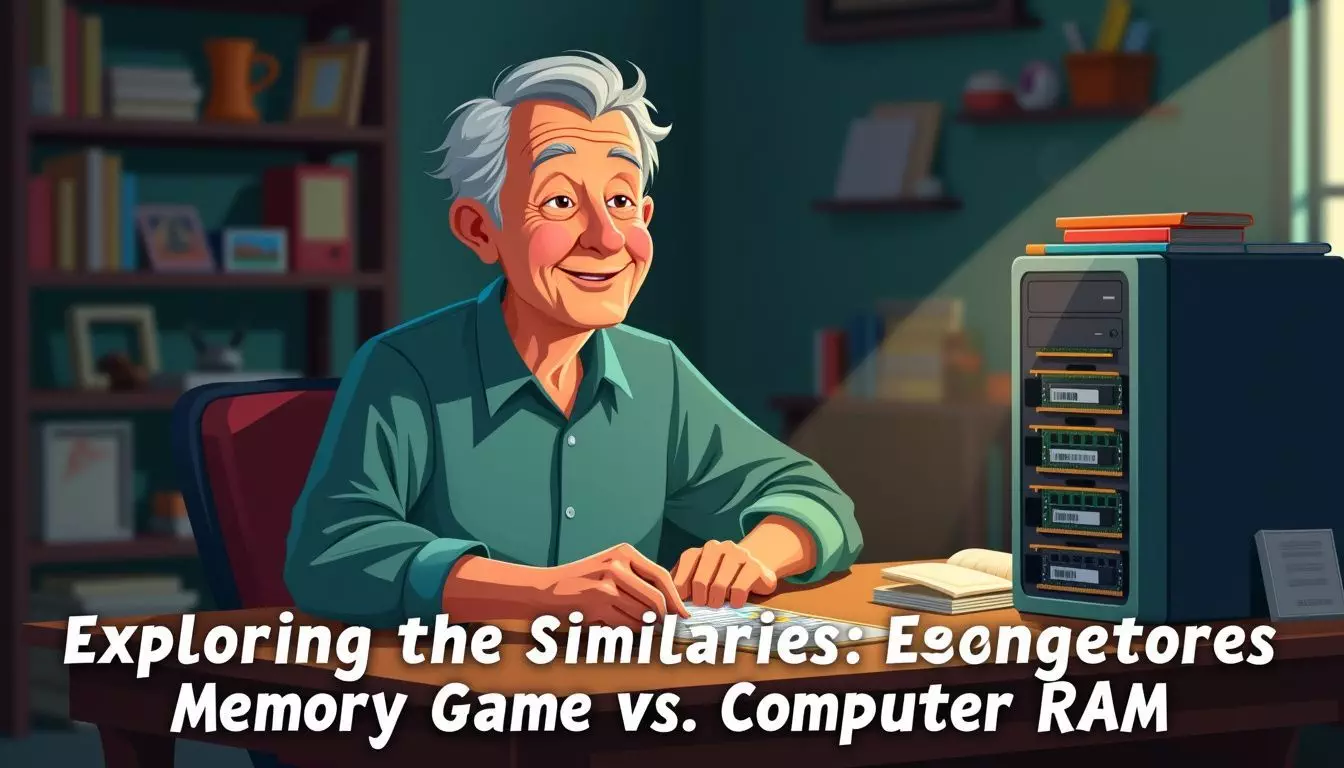Ever wondered how is this memory game similar to a computer’s RAM? Both are fascinating in their functions. They store data for quick access, boosting performance. Memory games challenge your brain, requiring you to remember and retrieve information swiftly—just like Random Access Memory (RAM) helps computers. 3
Alex Herrick excels in web design with sharp attention to user experience. His insights will guide us in exploring the surprising similarities between human cognition games and computer memory systems.
Ready for an intriguing read? 1 2
Key Takeaways
- Both memory games and RAM store data temporarily for fast access. This helps improve performance.
- More RAM can make a computer run faster. It allows better multitasking with apps and games.
- Memory games boost cognitive skills like problem-solving and quick thinking.
- Computer RAM is essential for running active programs smoothly but loses data when the power is off.
- Upgrading RAM or playing memory games can greatly enhance user experience in both computers and brain function.
Understanding the Basics of Memory in Games and Computers

Memory is key in both games and computers. It helps store data quickly for fast access… letting users enjoy a smoother experience.
What is Memory in Gaming?
In gaming, memory helps players keep track of what they see and do. It’s tied to skills like attention and quick thinking. Studies show that gamers perform better at tasks involving verbal and visuospatial working memory. 1
“Video games train your brain to think faster.” – Unknown
Memory games require players to remember patterns or sequences. This helps improve cognitive abilities like problem-solving and decision-making.
Next is computer RAM… 2What is Computer RAM?
Computer RAM stands for Random-Access Memory. It is a type of computer hardware that stores data temporarily. This storage is fast, allowing quick access for the operating system and software programs. 3
RAM size varies by device. Modern systems usually have 8GB to 32GB of RAM. The speed of RAM affects overall processing speed—a faster RAM means better performance.
Data stored in RAM gets wiped clean when the power is turned off. This makes it essential for tasks you’re working on right now, like running applications or browsing the web. 4
Now, let’s explore the similarities between memory games and Computer RAM…
Core Similarities between Memory Games and Computer RAM
Both memory games and Computer RAM store data temporarily for quick access. This speeds up tasks, making them essential for smooth performance.
Temporary Storage for Quick Access
RAM provides quick storage for data that the CPU needs. It speeds up tasks like opening games and apps. With RAM, your computer can switch between programs without slowing down. 5
More RAM means better performance and fast access to files. For a gaming computer, 16GB of RAM is ideal. In Alex’s words:.
Fast memory makes all the difference in gaming performance. 2
Essential for Speed and Performance
Memory in both games and computers is crucial. Fast access to memory speeds up everything. If your computer has enough RAM, it runs smoothly. You can run many programs at once without lag. 6
Games need quick memory too. High-speed memory reduces load times and keeps gameplay smooth. More RAM lets the game store data for easy access… This lowers wait times and boosts performance. 7
Next, let’s explore how upgrading improves user experience…
Upgradability to Enhance Experience
Users can upgrade RAM to boost system performance. More RAM means better multitasking, especially with demanding apps and games. Crucial® System Selector or Upgrade Selector tools help check compatibility. 5
Think about future computer use before upgrading. Compatibility matters for a smooth experience. More RAM enhances speed, helping run apps like video editing tools and large spreadsheets efficiently. 8
Impact of Memory on User Experience
Memory is crucial for smooth gaming and fast computer performance. More memory means better multi-tasking and quicker response times… gamers, YouTubers, and tech enthusiasts will notice the difference!
How Memory Affects Gaming Performance
Insufficient RAM can cause long game load times. In-game flickering will also happen without enough memory. A typical casual user needs 8GB of RAM, while power users need 32GB to play smoothly. 10
More RAM ensures smoother gameplay and faster loads. Gaming consoles like the PS5 or Xbox Series X talk about this type of memory often. More RAM means better performance for everyone playing games. 9The Role of RAM in Computer Responsiveness
RAM stores data for active programs, enabling quick access. This storage helps your CPU work faster by keeping essential information nearby. If a computer has 16 GB of RAM, it can handle more tasks at once without slowing down. 12
Increased RAM boosts multitasking capabilities and application speeds. Larger capacities allow you to run demanding software smoothly. For example, programs like video editors or game developers need lots of RAM to perform well.
More RAM means fewer delays and smoother operation of heavy applications on systems like personal computers or laptops. 11
Differences Highlighting Unique Functions
Memory games and computer RAM serve different purposes. Memory games use memory for playing fun challenges; computer RAM stores data quickly to run software and keep systems smooth.
Volatility vs. Non-volatility
Some essential differences between computer RAM and memory in games revolve around volatility and non-volatility. 14 Let’s break this down.
| Aspect | Volatility | Non-volatility |
|---|---|---|
| Definition | Memory that loses data when power is off | Memory that retains data across power cycles |
| Performance | Fast read/write operations | Slower read/write operations |
| Use Cases | For quick access by the CPU | For data storage and persistence |
| Examples | Computer RAM | HDDs and SSDs |
Interactive Use vs. Systematic Use
Memory Games and Computer RAM serve different purposes… both focus on memory but in distinct ways. Let’s break it down:
| Aspect | Memory Game | Computer RAM |
|---|---|---|
| Usage Type | Interactive | Systematic |
| Purpose | Engages users in repetitive tasks | Manages active data operations |
| Function | Enhances cognitive abilities | Facilitates real-time operations |
| Data Storage | Temporary for each session | Temporary, not for long-term storage |
| User Interaction | Interactive and engaging | Largely background and systematic |
| Outcome | Improves user skills | Boosts system performance |
Interactive and engaging, memory games help users develop cognitive skills. They require repetitive task engagement. This helps transfer skills and improve memory. 15
Computer RAM, systematic by nature, manages active data efficiently. It keeps data temporarily for real-time operations. Yet, it’s not suitable for long-term storage. RAM enhances computer responsiveness and speed. 16
Both share a common goal—improving performance through effective memory management. Yet, their applications differ… one engages humans interactively, the other aids systems systematically.
Conclusion
Both memory games and computer RAM boost performance. They enable quick access to data, enhancing speed and efficiency. Upgrading either can level up the experience… Think sharper gaming or faster computing! The temporary nature of both forms of memory underlines their crucial roles in real-time tasks.
Embrace these parallels for a smoother digital journey.
For more insights on enhancing your computing experience, check out our guide on how many cores are ideal for music production. In our guide, we delve into the importance of optimizing CPU cores for specific tasks, such as music production. Understanding how many cores are ideal for running multiple plugins and processing audio tracks simultaneously can greatly improve your workflow and overall performance. By optimizing CPU cores, you can ensure that your computer is operating at its full potential, allowing you to focus on creating music rather than dealing with technical limitations.
FAQs
1. What is the main similarity between a memory game and computer RAM?
Both involve storing and recalling information quickly. In a memory game, you remember card positions; in computer RAM, data storage happens for quick access by the CPU.
2. How does computer RAM differ from a hard drive or SSD?
RAM stores data temporarily for fast access while you’re using programs. A hard drive or SSD stores files long-term even when your system is powered off.
3. Why is dynamic random-access memory (DRAM) important in computers?
DRAM provides fast read-and-write capabilities crucial for running application software smoothly and efficiently handling real-time computing tasks.
4. How much RAM do I need to run modern games like on PlayStation 5 or Nintendo Switch?
Modern games usually need at least 8 GB of RAM to run well, but some demanding titles might require more—up to 16 GB or even 32 GB—for optimal performance.
5. What role does cache memory play compared to regular RAM?
Cache memory is faster than regular RAM—it helps speed up processes by storing frequently accessed data close to the CPU, reducing time spent fetching it from slower storage.
6. Can having too many browser tabs open affect my computer’s performance?
Yes! Each tab uses some amount of physical and virtual memory; too many can slow down your system as it struggles to manage all that stored information simultaneously.
References
- ^ https://www.kingston.com/en/blog/gaming/difference-between-memory-storage-gaming
- ^ https://www.techtarget.com/searchstorage/definition/RAM-random-access-memory
- ^ https://www.crucial.com/articles/about-memory/support-what-does-computer-memory-do
- ^ https://www.hp.com/us-en/shop/tech-takes/computer-memory-vs-storage
- ^ https://www.dell.com/support/kbdoc/en-us/000129805/how-random-access-memory-ram-affects-performance
- ^ https://www.cdw.com/content/cdw/en/articles/hardware/cpu-versus-ram-which-more-important-you.html
- ^ https://primetechsupport.com/blogs/gaming-pc-repairs/why-ram-matters-gamers-exploring-impact-on-performance?srsltid=AfmBOoqXMYvc_eCsnp2cyNHw436P61Vo7UsX_ehbfj7ZwPcqCCVikLQW
- ^ https://www.osgusa.com/the-role-of-ram-in-computer-performance/
- ^ https://www.intel.com/content/www/us/en/tech-tips-and-tricks/computer-ram.html
- ^ https://www.crystalrugged.com/knowledge/volatile-memory-vs-non-volatile-memory/
- ^ https://www.trentonsystems.com/en-us/resource-hub/blog/volatile-vs-nonvolatile-memory
- ^ https://escholarship.org/content/qt2bv998z0/qt2bv998z0_noSplash_8541af023c201fb0081d015a82e5cdd3.pdf?t=qwi2uq
- ^ https://www.researchgate.net/publication/375497329_An_Overview_of_Computer_Memory_Systems_and_Emerging_Trends

